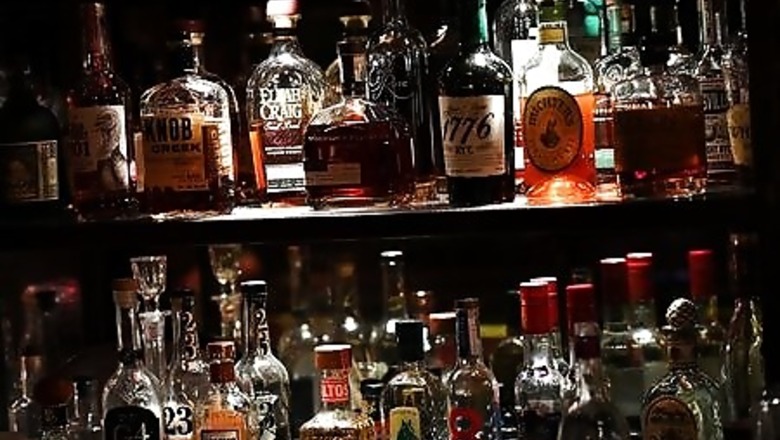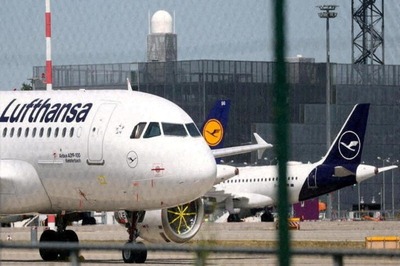
views
LONDON On a summer’s evening, the streets of central London echoed to what has become a rare sound during the coronavirus pandemic: the chatter and laughter of diners seated at terrace tables.
The launch on Monday of Britain’s state-funded, half-price Eat Out to Help Out scheme triggered a rush for some of the capital’s best-known eateries, and a broader rise in business at other restaurants.
The area around the former marketplace in Covent Garden was still largely devoid of its usual hordes of office workers, tourists and theatre-goers.
But the steep discounts whetted the appetite of the area’s remaining regulars at a nearby branch of By Chloe, a vegan restaurant chain. Its sales increased by 20% on the first day of the scheme compared with a week earlier.
Despite the signs of the initial success of the scheme, the lure of cheap lunches and dinners will not be a silver bullet for the country’s struggling hospitality industry.
Many people in Britain remain worried about the risk of infection in shared spaces, hampering efforts by Prime Minister Boris Johnson’s government to get the economy going again and to get workers back in their offices.
“Coming to London feels like you’ve walked into a scene from 28 Days Later,” Stephen Entwhistle said, referring to a post-apocalyptic horror film as he waited in By Chloe for his lunch.
The 35-year-old advertising worker said the scheme gave him a chance to lend a hand to Britain’s economy.
“I will probably go out a lot more now, rather than trying to decide what to cook every day,” Entwhistle said.
BIG DISCOUNT, BUT BIG PROBLEMS
Finance minister Rishi Sunak announced the scheme in July as part of a latest wave of emergency measures to shore up the economy which contracted by a quarter in the March-April period.
The 500 million-pound ($650 million) scheme offers 50% off the bill for eat-in food and drink – up to 10 pounds per person and excluding alcohol – on Mondays, Tuesdays and Wednesdays in August.
The government hopes the unprecedented subsidy, along with cuts to value-added tax for the hospitality sector, will help to reduce job losses at restaurants, cafes, bars and pubs which employ 1.8 million people.
Kate Nicholls, chief executive of UKHospitality, an industry group, welcomed the support but said around a third of Britain’s bars and restaurants are at risk of permanent closure.
“At the moment it’s taking a little while to unwind,” she said. The government’s emergency support, which also includes a massive job retention programme and rules preventing eviction by landlords until September, was helping to slow job losses.
“But they will start to come through,” Nichols said.
She said she was pressing Sunak for more support in his autumn budget, including measures to help bring down the burden of rents and debt taken on during the crisis.
Britain’s unemployment rate has held at just below 4%, kept down in large part by the job retention scheme. But employers who benefit from it must now make steadily rising contributions to its cost and it will be closed at the end of October.
The government’s budget forecasters have predicted the unemployment rate will hit 12% at the end of this year in their central scenario.
MISSING WORKERS
Scot Turner, vice president of operations at QOOT Co., which runs the By Chloe vegan food chain, said his firm would extend the 50% discount offer through September, without the government subsidy, in the hope of catching more returning workers.
But he added it was extremely worrying that some employers had advised staff not to return to the offices until 2021.
“My fear, in central London, is whether there’s enough being done to drag people back into town,” he said.
The degree of caution that consumers feel is also a big unanswered question for the Bank of England which on Thursday will announce its latest outlook for the economy.
The uncertainties underscore the scale of the challenge ahead even for restaurants that have been swamped with booking requests such as the Hawksmoor chain of steakhouses, which is offering an extra 10 pounds off between Monday and Wednesday in August, on top of the government’s subsidy.
When it announced 5,500 seats on its website with its Eat Out to Help Out offer, they were all gone within six hours.
“So far, the re-openings have gone better than we hoped,” said Huw Gott, one of Hawksmoor’s founders, above the growing hubbub from a dining room. “But who knows what September and October will bring?”
(Writing by William Schomberg; Editing by Alexandra Hudson)
Disclaimer: This post has been auto-published from an agency feed without any modifications to the text and has not been reviewed by an editor
Read all the Latest News, Breaking News and Coronavirus News here



















Comments
0 comment